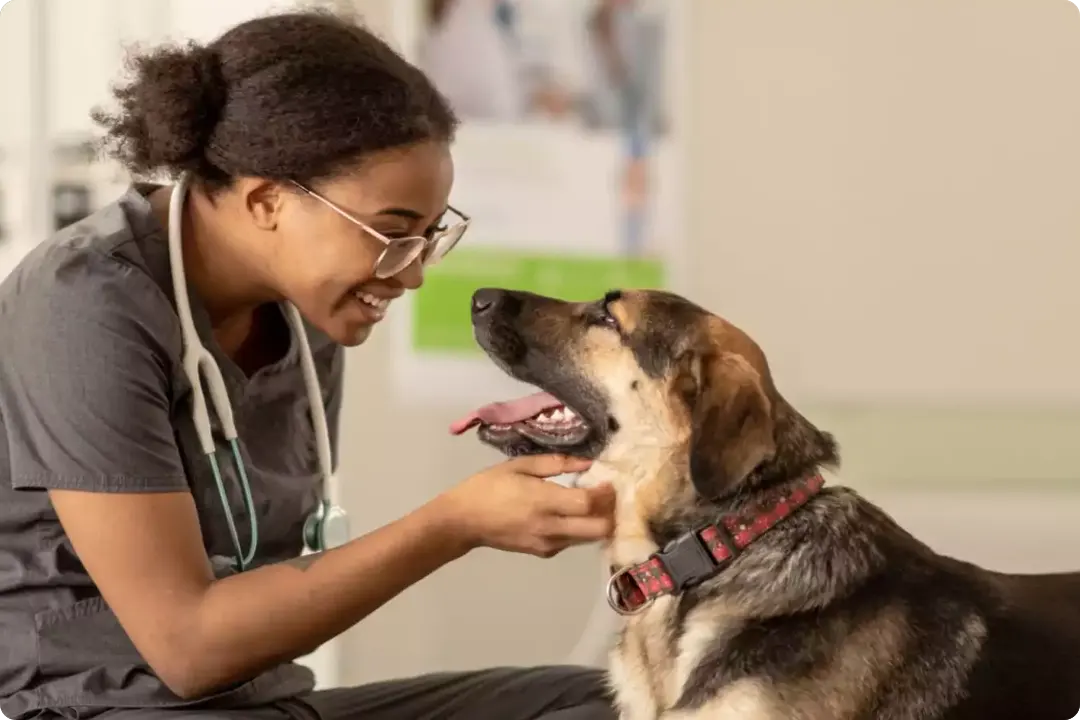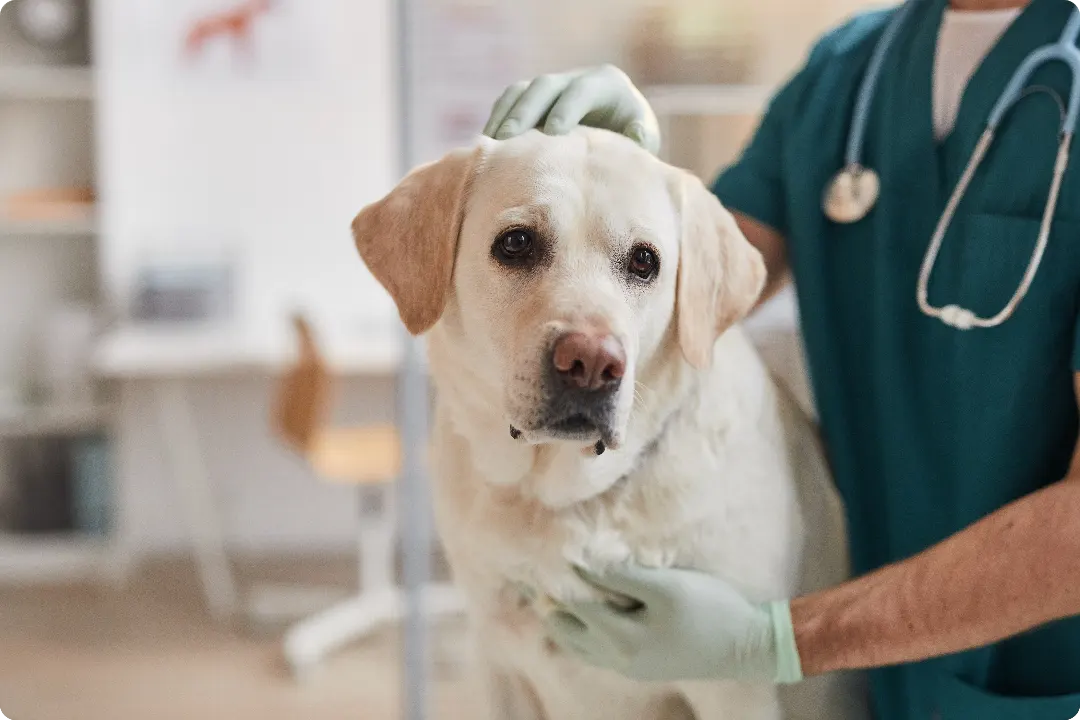
Over 4 Years of Science-Backed Experience
Learn more about the safety and efficacy of Librela, a monoclonal antibody therapy.

Clinical Study Efficacy Experience with Librela
In clinical studies, Librela was shown to:
- Be effective in controlling OA pain for dogs when given monthly1,2
- Reduce OA pain in dogs, which led to increased activity and improved quality of life1,2
- Target a root cause of OA pain and reduce pain signals, making it easier for dogs to move and play1-4
Safety and Side Effects
Librela is safe for most dogs when used according to its FDA-approved labeling, but a conversation with your veterinarian is the best way to confirm that Librela is right for your dog. For example, Librela should not be used in dogs with a sensitivity to the active ingredient, bedinvetmab. Librela also shouldn't be used in dogs who are pregnant, breeding, or lactating.
The most common side effects that occurred in clinical studies in dogs taking Librela vs placebo (no medicine) were urinary tract infection, bacterial skin infection, dermatitis, and increased blood urea nitrogen (BUN).1,2*
Adverse events reported post-approval include ataxia (unsteady movements), anorexia (loss of appetite), lethargy (extreme tiredness), emesis (vomiting), and polydipsia (increased drinking).
Globally, adverse events have been reported post-approval at a rate of between 10 to 100 times per 10,000 doses distributed. No single category of adverse event has been reported at a rate higher than 10 times per 10,000 doses.
While we report all adverse events in full compliance with the law, we acknowledge that this information is imperfect, as reporting by pet owners and veterinarians is voluntary and we cannot confirm that all doses distributed have been administered, but it is the best post-approval indicator we or any other company has as to the actual rate of adverse events occurring.
*For the vast majority of dogs, an increase in BUN was not associated with kidney disease.

Post-Approval Data
After more than 4 years on the market in Europe and with approvals in over 50 countries, millions of doses of Librela have been given. No single adverse event sign is reported at a rate higher than rare (defined as <10 per 10,000 dogs treated).†‡ Your vet can help you determine if Librela is the best treatment for your dog.
As with most medicines, there are potential side effects. In clinical studies, the following were most frequently reported1,2:
- Increased blood urea nitrogen (BUN)§
- Urinary tract infection
- Bacterial skin infection
- Dermatitis

After the approval of Librela, additional side effects were reported. Not all side effects are reported to the FDA or Center for Veterinary Medicine. It is not always possible to reliably estimate side effect frequency or establish a causal relationship to product exposure using these data. Additional side effects in dogs reported are:
- Neurological: ataxia, seizures, paresis, proprioception deficits, paralysis
- General: anorexia, lethargy, recumbency
- Urinary: polydipsia, polyuria/pollakiuria, urinary incontinence
- Gastrointestinal: vomiting, diarrhea
- Musculoskeletal: muscle weakness, muscle tremors, lameness
In some cases, death (including euthanasia) has been reported as an outcome of the side effects listed above. Always have a conversation with a veterinarian to consider the risks and benefits of any treatment.
†EMA Veterinary product information (QRD) templates – Annex I Summary of Product Characteristics. https://www.ema.europa.eu/en/documents/template-form/qrd-veterinary-product-information-annotated-template-english-version-91_en.pdf. Accessed 17 December 2024.
‡This information has been collected after approval and is based on pharmacovigilance reports and assessments. These data are dependent on voluntary reporting by veterinarians and pet owners; therefore, underreporting occurs, and more serious adverse events may have higher rates of reporting for some products.
§For the vast majority of dogs, an elevation in BUN was not associated with kidney disease.
The Approval Process
Any new drug must undergo a rigorous testing and approval process to show that it’s safe for dogs and that it consistently does what it claims to do. It can take years for a product to hit the market after testing begins.
What's The Process?
- Zoetis’ scientists begin formulating a new drug for a specific use in a specific animal.
- Extensive research is done in the lab to figure out proper dosing and to ensure the product is safe for pets and safe for the environment.
- Field trials are conducted on pets to further make sure the product does what it’s supposed to do and determine the most common adverse effects.
- Once these studies are completed, the results are provided to the FDA for their independent review.
- The FDA's team of veterinarians, scientists, toxicologists, and more review the research and, in some cases, may ask for more testing to be done.
- If they're satisfied that the submitted testing reports support the safety and efficacy of the drug, the product is approved. Zoetis and the FDA continuously monitor the drug's safety and efficacy while it remains on the market.
- Our commitment does not stop at approval. We continuously monitor post-approval experience and work with the FDA to update the label when necessary, ensuring veterinarians and pet owners have the most accurate and up-to-date information.

Hear from Our Experts
In a recent survey, nearly 8 out of 10 vets said they were very satisfied with Librela.5 We work closely with veterinarians to ensure they’re given the most up-to-date information about each product and to receive their firsthand feedback.
How We Monitor Side Effects
At Zoetis, we take suspected adverse events very seriously for all of our products, including Librela. Our team of veterinary experts work alongside both pet owners and their attending veterinarians to understand each pet’s unique situation when brought to our attention. And we report every potential adverse event we receive directly to regulators like the Food and Drug Administration (FDA) and the European Medicines Agency (EMA).
At Zoetis, we take suspected adverse events very seriously for all of our products, including Librela. Our team of veterinary experts work alongside both pet owners and their attending veterinarians to understand each pet’s unique situation when brought to our attention. And we report every potential adverse event we receive directly to regulators like the FDA and EMA.
Zoetis has systems in place to continuously monitor the volume and trends of adverse event reporting related to all of our veterinary medicines, including Librela. In compliance with the law, we share these reports of aggregated case data to regulatory agencies around the world, and if a new safety signal emerges, we partner with regulatory authorities on appropriate actions which could include amendment of our label as necessary to better inform veterinarians and pet owners of potential risks or safety concerns to mitigate risks to the pet.
Globally, adverse events have been reported post-approval at a rate of between 10 to 100 times per 10,000 doses distributed. No single category of adverse event has been reported at a rate higher than 10 times per 10,000 doses.
While we report all adverse events in full compliance with the law, we acknowledge that this information is imperfect, as reporting by pet owners and veterinarians is voluntary and we cannot confirm that all doses distributed have been administered, but it is the best post-approval indicator we or any other company has as to the actual rate of adverse events occurring.
We encourage all pet owners who believe their pet may have had an adverse reaction to any medication to contact their pet’s veterinarian first. Pet owners also need to contact Zoetis, and when they do, we document the conversation and make every effort to include the attending veterinarian in the conversation. This helps us fully understand each case and report the potential adverse effect to the appropriate regulatory body. We always encourage pet owners to also speak with their veterinarian for further consultation and advice after speaking with the Zoetis team.
Please refer to the full Prescribing Information and Client Information Sheet for approved product labeling and Important Safety Information. Call our medical support team at 1‑888‑963‑8471 or contact them by clicking here.
IMPORTANT SAFETY INFORMATION: See full Prescribing Information. Librela is for use in dogs only. Women who are pregnant, trying to conceive or breastfeeding should take extreme care to avoid self-injection. Hypersensitivity reactions, including anaphylaxis, could potentially occur with self-injection. Librela should not be used in breeding, pregnant, or lactating dogs. Librela should not be administered to dogs with known hypersensitivity to bedinvetmab. Adverse events reported post-approval include ataxia (lack of balance/coordination), anorexia (loss of appetite), lethargy (tiredness), emesis (vomiting), and polydipsia (increased drinking). The most common adverse events reported in a clinical study were urinary tract infections, bacterial skin infections and dermatitis (skin irritation/inflammation).
See the Client Information Sheet for more information about Librela.
- Corral MJ, Moyaert H, Fernandes T, et al. A prospective, randomized, blinded, placebo-controlled multisite clinical study of bedinvetmab, a canine monoclonal antibody targeting nerve growth factor, in dogs with osteoarthritis. Vet Anaesth Analg. 2021;48(6):943-955. doi:10.1016/j.vaa.2021.08.001
- Michels GM, Honsberger NA, Walters RR, Tena JKS, Cleaver DM. A prospective, randomized, double-blind, placebo-controlled multisite, parallel-group field study in dogs with osteoarthritis conducted in the United States of America evaluating bedinvetmab, a canine anti-nerve growth factor monoclonal antibody. Vet Anaesth Analg. 2023;50(5):446-458. doi:10.1016/j.vaa.2023.06.003
- Keizer RJ, Huitema AD, Schellens JH, Beijnen JH. Clinical pharmacokinetics of therapeutic monoclonal antibodies. Clin Pharmacokinet. 2010;49(8):493-507. doi:10.2165/11531280
- Isola M, Ferrari V, Miolo A, et al. Nerve growth factor concentrations in the synovial fluid from healthy dogs and dogs with secondary osteoarthritis. Vet Comp Orthop Traumatol. 2011;24(4):279-284. doi:10.3415/VCOT-10-04-0051
- Librela Vet Pulse W3, March 2023, Forward Group.


